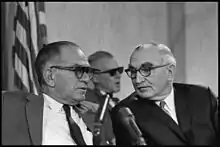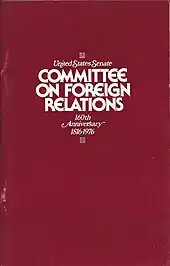United States Senate Committee on Foreign Relations
The United States Senate Committee on Foreign Relations is a standing committee of the U.S. Senate charged with leading foreign-policy legislation and debate in the Senate. It is generally responsible for overseeing and funding foreign aid programs; funding arms sales and training for national allies; and holding confirmation hearings for high-level positions in the Department of State.[1] Its sister committee in the House of Representatives is the Committee on Foreign Affairs.[note 1]
| Standing committee | |
|---|---|
Active United States Senate 117th Congress | |
 | |
| History | |
| Formed | 1816 |
| Leadership | |
| Chair | Bob Menendez (D) Since January 20, 2021 |
| Ranking member | Jim Risch (R) Since January 20, 2021 |
| Structure | |
| Seats | 22 members |
| Political parties | Majority (11)
|
| Jurisdiction | |
| Policy areas | Foreign policy, aid, diplomacy |
| Oversight authority | Department of State Agency for International Development |
| House counterpart | House Committee on Foreign Affairs |
| Meeting place | |
| 423 Dirksen Senate Office Building Washington, D.C. | |
| Website | |
| www | |
| Rules | |
Along with the Finance and Judiciary committees, the Foreign Relations Committee is among the oldest in the Senate, dating to the initial creation of committees in 1816.[2] It has played a leading role in several important treaties and foreign policy initiatives, including the Alaska purchase, the establishment of the United Nations, and the passage of the Marshall Plan.[2] The committee has also produced eight U.S. presidents—Andrew Jackson, James Buchanan, Andrew Johnson, Benjamin Harrison, Warren Harding, John F. Kennedy, Barack Obama, and Joe Biden—and 19 Secretaries of State. Notable members include Arthur Vandenberg, Henry Cabot Lodge, and William Fulbright.
Due to its long history, influence in U.S. foreign policy, jurisdiction over all diplomatic nominations, and its being the only Senate committee to deliberate and report treaties, the Foreign Relations Committee is considered one of the most powerful and prestigious in the Senate.[3]
History
Between 1887 and1907, Alabama Democrat John Tyler Morgan played a leading role on the committee. Morgan called for a canal linking the Atlantic and Pacific oceans through Nicaragua, enlarging the merchant marine and the Navy, and acquiring Hawaii, Puerto Rico, the Philippines and Cuba. He expected Latin American and Asian markets would become a new export market for Alabama's cotton, coal, iron, and timber. The canal would make trade with the Pacific much more feasible, and an enlarged military would protect that new trade. By 1905, most of his dreams had become reality, with the canal passing through Panama instead of Nicaragua.[4]
During World War II, the committee took the lead in rejecting traditional isolationism and designing a new internationalist foreign policy based on the assumption that the United Nations would be a much more effective force than the old discredited League of Nations. Of special concern was the insistence that Congress play a central role in postwar foreign policy, as opposed to its ignorance of the main decisions made during the war.[5] Republican senator Arthur Vandenberg played the central role. In 1943, a confidential analysis of the Senate Foreign Relations Committee was made by British scholar Isaiah Berlin for the Foreign Office.[6][7]

In 1966, as tensions over the Vietnam War escalated, the committee set up hearings on possible relations with Communist China. Witnesses, especially academic specialists on East Asia, suggested to the American public that it was time to adopt a new policy of containment without isolation. The hearings Indicated that American public opinion toward China had moved away from hostility and toward cooperation. The hearings had a long-term impact when Richard Nixon became president, discarded containment, and began a policy of détente with China.[8] The problem remained of how to deal simultaneously with the Chinese government on Taiwan after formal recognition was accorded to the Beijing government. The committee drafted the Taiwan Relations Act (US, 1979) which enabled the United States both to maintain friendly relations with Taiwan and to develop fresh relations with China.[9]
In response to conservative criticism that the state department lacked hardliners, President Ronald Reagan in 1981 nominated Ernest W. Lefever as Assistant Secretary of State. Lefever performed poorly at his confirmation hearings and the Senate Committee on Foreign Relations rejected his nomination by vote of 4-13, prompting Lefever to withdraw his name.[10] Elliot Abrams filled the position.
Republican senator Jesse Helms, a staunch conservative, was committee chairman in the late 1990s. He pushed for reform of the UN by blocking payment of U.S. membership dues.[11]
Members, 117th Congress
| Majority | Minority |
|---|---|
|
|
Subcommittees
| Subcommittees | Chair | Ranking Member |
|---|---|---|
| Africa and Global Health Policy | Lindsey Graham (R-SC) | Tim Kaine (D-VA) |
| East Asia, The Pacific, and International Cybersecurity Policy | Cory Gardner (R-CO) | Ed Markey (D-MA) |
| Europe and Regional Security Cooperation | Ron Johnson (R-WI) | Jeanne Shaheen (D-NH) |
| Near East, South Asia, Central Asia, and Counterterrorism | Mitt Romney (R-UT) | Chris Murphy (D-CT) |
| Multilateral International Development, Multilateral Institutions, and International Economic, Energy and Environmental Policy | Todd Young (R-IN) | Jeff Merkley (D-OR) |
| State Department and USAID Management, International Operations, and Bilateral International Development | John Barrasso (R-WY) | Cory Booker (D-NJ) |
| Western Hemisphere, Transnational Crime, Civilian Security, Democracy, Human Rights and Global Women's Issues | Marco Rubio (R-FL) | Ben Cardin (D-MD) |
Chairmen (1816–present)

Historical committee rosters
Members, 116th Congress
| Majority | Minority |
|---|---|
|
|
| Subcommittees | Chair | Ranking Member |
|---|---|---|
| Africa and Global Health Policy | Lindsey Graham (R-SC) | Tim Kaine (D-VA) |
| East Asia, The Pacific, and International Cybersecurity Policy | Cory Gardner (R-CO) | Ed Markey (D-MA) |
| Europe and Regional Security Cooperation | Ron Johnson (R-WI) | Jeanne Shaheen (D-NH) |
| Near East, South Asia, Central Asia, and Counterterrorism | Mitt Romney (R-UT) | Chris Murphy (D-CT) |
| Multilateral International Development, Multilateral Institutions, and International Economic, Energy and Environmental Policy | Todd Young (R-IN) | Jeff Merkley (D-OR) |
| State Department and USAID Management, International Operations, and Bilateral International Development | John Barrasso (R-WY) | Cory Booker (D-NJ) |
| Western Hemisphere, Transnational Crime, Civilian Security, Democracy, Human Rights and Global Women's Issues | Marco Rubio (R-FL) | Ben Cardin (D-MD) |
Members, 115th Congress
| Majority | Minority |
|---|---|
| Subcommittees | Chair | Ranking Member |
|---|---|---|
| Near East, South Asia, Central Asia, and Counterterrorism | Jim Risch (R-ID) | Tim Kaine (D-VA) |
| Western Hemisphere, Transnational Crime, Civilian Security, Democracy, Human Rights and Global Women's Issues | Marco Rubio (R-FL) | Ben Cardin (D-MD) since February 6, 2018 Bob Menendez (D-NJ) until February 6, 2018 |
| Europe and Regional Security Cooperation | Ron Johnson (R-WI) | Chris Murphy (D-CT) |
| Africa and Global Health Policy | Jeff Flake (R-AZ) | Cory Booker (D-NJ) |
| East Asia, The Pacific, and International Cybersecurity Policy | Cory Gardner (R-CO) | Ed Markey (D-MA) |
| Multilateral International Development, Multilateral Institutions, and International Economic, Energy and Environmental Policy | Todd Young (R-IN) | Jeff Merkley (D-OR) |
| State Department and USAID Management, International Operations, and Bilateral International Development | Johnny Isakson (R-GA) | Jeanne Shaheen (D-NH) |
Members, 114th Congress
| Majority | Minority |
|---|---|
Sources: 2015 Congressional Record, Vol. 161, Page S297 –297, 661–662
| Subcommittee | Chair | Ranking Member |
|---|---|---|
| Near East, South Asia, Central Asia and Counterterrorism | Jim Risch (R-Idaho) | Chris Murphy (D-Conn.) |
| Western Hemisphere, Transnational Crime, Civilian Security, Democracy, Human Rights and Global Women's Issues | Marco Rubio (R-Fla.) | Barbara Boxer (D-Calif.) |
| Europe and Regional Security Cooperation | Ron Johnson (R-Wisc.) | Jeanne Shaheen (D-N.H.) |
| Africa and Global Health Policy | Jeff Flake (R-Ariz.) | Ed Markey (D-Mass.) |
| State Department and USAID Management, International Operations and Bilateral International Development | Rand Paul (R-Ky.) | Barbara Boxer (D-Calif.) |
| East Asia, The Pacific and International Cybersecurity Policy | Cory Gardner (R-Colo.) | Ben Cardin (D-Md.) |
| International Development, Multilateral Institutions and International Economic, Energy and Environmental Policy | John Barrasso (R-Wyo.) | Tom Udall (D-N.M.) |
Members, 113th Congress
| Majority | Minority |
|---|---|
|
|
Sources: 2013 Congressional Record, Vol. 159, Page S297 –297, 661–662

| Subcommittee | Chair | Ranking Member |
|---|---|---|
| International Operations and Organizations, Human Rights, Democracy and Global Women's Issues | Barbara Boxer (D-CA) | Rand Paul (R-KY) |
| East Asian and Pacific Affairs | Ben Cardin (D-MD) | Marco Rubio (R-FL) |
| African Affairs | Chris Coons (D-DE) | Jeff Flake (R-AZ) |
| Western Hemisphere and Global Narcotics Affairs | Tom Udall (D-NM) | John McCain (R-AZ) |
| European Affairs | Chris Murphy (D-CT) | Ron Johnson (R-WI) |
| Near Eastern and South and Central Asian Affairs | Tim Kaine (D-VA) | Jim Risch (R-ID) |
| International Development and Foreign Assistance, Economic Affairs and International Environmental Protection, and Peace Corps | Tim Kaine (D-VA), until 2013 Ed Markey (D-MA), from 2013 |
John Barrasso (R-WY) |
Notes
- Renamed from Committee on International Relations by the 110th Congress in January 2007.
References
- History of the Committee
- "Committee History & Rules | United States Senate Committee on Foreign Relations". www.foreign.senate.gov. Retrieved January 22, 2021.
- Publisher, Author removed at request of original (November 16, 2016), "12.6 Committees", American Government and Politics in the Information Age, University of Minnesota Libraries Publishing edition, 2016. This edition adapted from a work originally produced in 2011 by a publisher who has requested that it not receive attribution., retrieved January 22, 2021
- Joseph A. Fry, "John Tyler Morgan's Southern Expansionism," Diplomatic History (1985) 9#4 pp: 329-346.
- Roland Young, Congressional Politics in the Second World War (1958), pp 168–96
- Hachey, Thomas E. (Winter 1973–1974). "American Profiles on Capitol Hill: A Confidential Study for the British Foreign Office in 1943" (PDF). Wisconsin Magazine of History. 57 (2): 141–153. JSTOR 4634869. Archived from the original (PDF) on October 21, 2013.
- James A. Gazell, "Arthur H. Vandenberg, Internationalism, and the United Nations." Political Science Quarterly (1973) pp: 375-394. in JSTOR
- Katherine Klinefelter, "The China Hearings: America's Shifting Paradigm on China," Congress & the Presidency (2011) 38#1 pp: 60-76.
- Jacob K. Javits, "Congress And Foreign Relations: The Taiwan Relations Act," Foreign Affairs (1981) 60#1 pp 54-62
- Robert David Johnson (2005). Congress and the Cold War. Cambridge UO. pp. 253–54.
- William A. Link, Righteous Warrior: Jesse Helms and the Rise of Modern Conservatism (2008)
- Sen. Menendez voluntarily stepped down as Ranking Member on 1 April 2015 after being indicted by the Justice Department. Menendez Gives Up Foreign Relations Post
Further reading
- Carter, Ralph G. and James Scott, eds. Choosing to Lead : Understanding Congressional Foreign Policy Entrepreneurs (Duke University Press, 2009)
- Crabb, Cecil Van Meter, and Pat M. Holt. Invitation to struggle: Congress, the president, and foreign policy (CQ Press, 1992)
- Dahl, Robert A. Congress and Foreign Policy (1950)
- Farnsworth, David Nelson. The Senate Committee on Foreign Relations (University of Illinois Press, 1961), a topical survey of the Committee's activity from 1947 to 1956.
- Frye, Alton. "'Gobble'uns' and foreign policy: a review," Journal of Conflict Resolution (1964) 8#3 pp: 314-321. Historiographical review of major books
- Gagnon, Frédérick. "Dynamic Men: Vandenberg, Fulbright, Helms and the Activity of the Chairman of the US Senate Foreign Relations Committee Since 1945." online (2013)
- Gazell, James A. "Arthur H. Vandenberg, Internationalism, and the United Nations." Political Science Quarterly (1973): 375-394. in JSTOR
- Gould, Lewis. The Most Exclusive Club : A History of the Modern United States Senate (2006)
- Hewes, James E. Jr. "Henry Cabot Lodge and the League of Nations". Proceedings of the American Philosophical Society (1970) 114#4 pp: 245–255.
- Hitchens, Harold L., "Influences of the Congressional Decision to Pass the Marshall Plan" Western Political Science Quarterly (1968) 21#1 pp: 51-68. in JSTOR
- Jewell, Malcolm E. Senatorial Politics and Foreign Policy (U. of Kentucky Press, 1962)
- Kaplan, Lawrence S. The Conversion of Senator Arthur H. Vandenberg: From Isolation to International Engagement (University Press of Kentucky, 2015)
- Link, William A. Righteous Warrior: Jesse Helms and the Rise of Modern Conservatism (2008)
- McCormick, James M. "Decision making in the foreign affairs and foreign relations committees." in Randall B. Ripley and James M. Lindsay, eds.. Congress resurgent: foreign and defense policy on Capitol Hill (University of Michigan press, 1993) pp: 115-153
- Maguire, Lori. "The US Congress and the politics of Afghanistan: an analysis of the Senate Foreign Relations and Armed Services Committees during George W Bush's second term." Cambridge Review of International Affairs (2013) 26#2 pp: 430-452.
- Shaw, John T. (2012). Richard G. Lugar, Statesman of the Senate: Crafting Foreign Policy from Capitol Hill. Indiana UP. p. 73.
- Robinson, James A. Congress and Foreign Policy-Making (1962), statistical study of roll calls emphasizing the importance of the Committee
- Spanier, John, and Joseph Nogee, eds. Congress, the Presidency and American Foreign Policy (Elsevier, 2013)
- Warburg, Gerald Felix. Conflict and consensus: The struggle between Congress and the president over foreign policymaking (HarperCollins Publishers, 1989)
- Woods, Randall Bennett. Fulbright : A Biography (Cambridge University Press, 1995)
- Young, Roland. Congressional Politics in the Second World War (1958), pp 168–96
Primary sources
- Vandenberg, Arthur Hendrick, and Joe Alex Morris, eds. The private papers of Senator Vandenberg. (1952)
External links
| Wikimedia Commons has media related to United States Senate Foreign Relations Committee. |